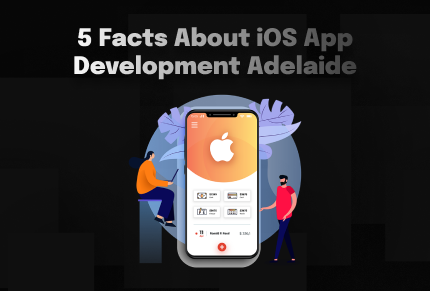Mobile application development involves building software that is meant to run a mobile device and take advantage of the features and hardware on the device. Developers can create different types of mobile applications, including native apps, cross-platform apps, hybrid apps, and HTML5 apps.
Smartphones and tablets have exploded in popularity, leading to the consequent widespread use of mobile apps. Apps have become an essential part of most businesses, with revenues as high as hundreds of billions of dollars. It can be used in a wide range of industries and companies.
The primary purpose of a mobile application development is to use the features and hardware on a mobile device, like GPS, Bluetooth, cameras, sensors, and more. Mobile applications development have various functions, from augmented reality and barcode scanning to online shopping and hiring services.
In Mobile application development, developers focus on making one that can operate on a minimum set of hardware. They can then be downloaded from app stores or directly on the internet.
There’s a lot to think about regarding mobile apps, from whether your company needs them to factors to consider. You also have to think about hiring a mobile application development service. We will cover these and more in the article below.
Should Your Company Build a Mobile App?
When you ask yourself this question, you should consider the statistics below.
• 70% of US digital media is gotten from mobile apps.
• About 49% of people open an app more than 11 times a day.
• The average smartphone user uses 30 apps monthly and 10 apps a day.
• The mobile application development industry is expected to be worth almost 700 billion dollars in 2022.
These statistics show a brand new way that businesses can communicate with their customers, which was not possible about ten years ago. With a mobile application development, companies access diverse marketing opportunities to move them closer to their target audience. You can read this guide to learn more about why a mobile application development is essential.
Mobile application development also provides different features that help businesses overtake the competition. Here are some ways mobile application development take companies ahead of the competition.
Offer Unique Services that Make Them Stand Out
Leveraging mobile applications development will allow a business to provide its services in competitive ways. You can look for new ways to present your products and services to customers that your competitors haven't offered before and take business away from the competition with minimal effort.
Raise the Barrier to Entry in the Market
Also, businesses can raise the barrier to entry in a particular market when they provide their services through mobile apps on Android and iOS. This is especially when no other company or very few businesses have done this. By releasing a mobile app, any other start-up will need to do the same, thus increasing the barrier of entry and keeping your position in the market.
Enhance Your User Experience
One thing that customers are constantly looking for when hiring a business is convenience and ease. The mobile experience can offer this to customers, giving you a competitive edge in the field. For instance, you can provide a mobile app that can still work without an internet connection, increasing the value offered to customers. It also creates a seamless relationship with customers, and businesses only have to put in minimal effort to maintain this.
Types of Mobile Applications
Mobile application development come in different types, with several frameworks and programming languages. Although the most standard types of operating systems are iOS and Android, the apps can still vary. The different types of apps include native, hybrid, HTML5, and cross-platform apps.
Native Apps
Native apps are applications built for a particular platform, whether Android or iOS, through software development languages and tools that support these systems. Android uses tools like Java, Eclipse, C++, and Kotlin, while iOS is limited to Objective-C and Xcode.
Native apps are well-liked by businesses and developers because they allow them to leverage their full potential. Since the app is built mainly for its operating system, it has access to sensors, cameras, and other features.
Native apps are even used in creating smart homes by integrating wearables, smart screens, and the Internet of Things. This is time-consuming and more expensive, so it's not ideal for all businesses. Learn more about native mobile application development here.
HTML5 Apps
HTML5 apps are based on HTML5, CSS, and JavaScript, which are the basic standards for web technologies. HTML5 apps use a write-once-run-anywhere approach and are compatible with different types of platforms.
These apps only need little changes to operate entirely on any operating system. They are also called web apps and are displayed on a browser on your mobile device or desktop. Despite that, HTML5 apps send desktop notifications and interact with customers through email.
Although web apps are usable, they are not as convenient and popular as native apps. Studies have shown that most people spend their time on mobile apps than web apps.
Hybrid Apps
Hybrid apps are a combination of native apps and HTML5 apps. The apps allow for creating a feature in native apps that will enable developers to embed an HTML5 app inside it. It gives you the functionality, diversity, and uniqueness of a native app, but like HTML5 apps, you can operate them on both iOS and Android devices.
Nowadays, many apps are hybrid apps, like Instagram, Twitter, Discord, and others. The apps can be downloaded on the app store of different operating systems without any changes.
Cross-Platform Apps
Cross-platform apps are mobile apps that are compatible with different operating systems. As the names imply, the apps can work on smartphones, tablets, desktops, smartwatches, and even TVs. These apps are made with 70 – 90% reusable codes, making it easy for developers to make them for different platforms.
Cross-platform apps are also easy to maintain and update and can reach a broader audience. It also saves a lot of time for developers since they don't have to make the app for multiple platforms. Famous examples of cross-platform apps include Bloomberg, Walmart, Facebook, and Instagram. Learn more about how to develop a mobile apps development.
What to Consider When Building a Mobile App
Before building a mobile application development, you need to consider different factors and ask yourself different questions. This way, you can ensure that the app is giving value to your business.
Does Your Business Need an App?
It would be best to consider whether you need a mobile app or not for your business. While there are a lot of benefits that come with using mobile apps, you should think about whether it is the right time for your business to launch one. Is it relevant to your business now? Will it offer long-term benefits? There are a lot of resources involved in using an app, so it should be considered thoroughly.
What Platform Will You Use?
The next thing to consider is what platform you will launch your mobile app. It depends on your audience, although it's usually better to make it for Android and Apple. Android is a popular platform for cheap brands, especially those not looking to sell. It's also an excellent choice for businesses that want to target markets in Africa and Asia. But, Apple is for developers that want to sell their mobile applications.
Do You Have Enough Time to Build and Launch?
You also have to consider the timeframe for building a mobile app. Depending on the type of app, it can take between four and six months, and there still has to be time for testing and debugging. It is also essential to consider the registration process of Google Play and the App Store.
What About Your Competitors?
It's also important to keep in mind the competitors you are dealing with when building an app. You should research the market and see which other business has an app and how well they are doing. Also, check what they might have missed in their app so that yours can stand out even more.
Should You Hire a Professional Service?
Another critical question is whether you should hire a professional mobile application development service. You can leverage your resources and team capabilities if you have an in-house team. But if not, it's better to hire a development company rather than look for different developers and designers.
How Will You Monetize the Mobile Applications?
You can make money with your app, either by making it paid, freemium services, or in-app purchases. You can also monetize the app by placing fees on updates and more. There are multiple monetizing models, so consider whichever is best for your business.
What About Updates and Maintenance?
Even after launching your mobile app, you need to consider maintenance, updates, and marketing. Consider the strategy after launching so that your customers will constantly use the mobile app rather than download it and forget it.
Can You Afford Mobile Application Development?
It would be best to think about whether your business model could afford it. There are a lot of resources involved in launching an app. Even Apple can take up to 30% of your sales revenue, and you have to pay for development and marketing.
What is the Process of Mobile Application Development?
When building a mobile application, there is a process you need to follow. While it can change, it follows the basic steps below:
1. Define your strategy and decide the objectives of your mobile application development.
2. Prepare your roadmap and minimum viable product if you need it.
3. Take care of the user interface and user experience design.
4. Develop the app, which involves the backend, front-end, and API.
5. Testing and debugging.
6. Deploy and launch the app on any store.
There's a lot more involved in building an app than this, and you can learn about them in this article.
Choosing the Ideal Programming Language
Another thing you need to keep in mind when looking at mobile application development is the programming language involved. It might be even harder to choose if you're not a technical person. Although with a mobile application development company, you can benefit from having a professional consulting with you on which one is best.
There are only two programming languages for iPhone, making it hard to choose. It's even harder to select Android devices since there are so many of them. There are different things to keep in mind when selecting the correct programming language:
• Check whether the language you are using offers proper support for your app and if it is feasible in the long run.
• Consider the infrastructure of devices and new phones.
• Think about whichever is best for web and mobile projects.
• Do you need to consider the language's libraries, tools, and features?
• Consider time, budget, and resource constraints on the project.
• It's essential to think about security considerations.
Different types of programming languages can be used for mobile app development. Learn more about them in this guide before choosing one for your project.
Hiring a Mobile Application Development Team
If you've decided to build a mobile application, you need to think about hiring a development team for the project. There are different things to think about, like the costs of developing a mobile app, the expertise of the team, and their reputation.
It's best to look for a reliable Android and iOS app development company and hire them so that you can enjoy more value for your money. Since a mobile application is strategic to your company, hiring a passionate team for your success is essential.
Conclusion
Mobile application development bring a lot of value to businesses, especially when launched at the right time. So, consider the different factors involved in this guide and consult with a professional before building an app for your business.
You can leverage the benefits and reduce the downsides that an app can provide by doing this. It’s also important to consider the cost and resources involved in building an app and whether your business can handle it.
You can also move ahead of the competition and offer value to your customers.
Checkout our latest content on Instagram.














